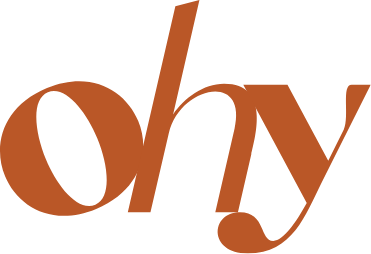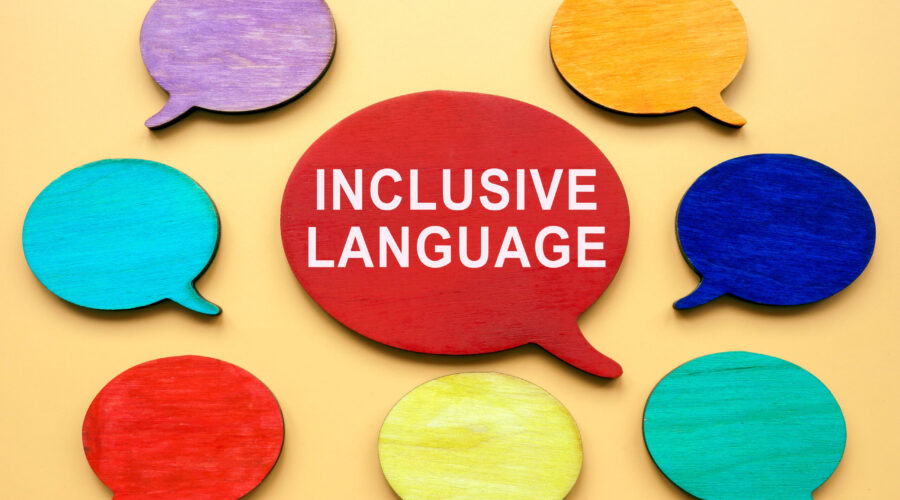How to Practice the Inclusive Language Principles
You may have heard of the phrase “words matter” before. Whether or not you heeded the advice, the statement is true. Words not only matter within the context of public speaking or multinational campaigns, but they also have a specific influence on people in intimate settings – the words chosen for wedding vows, the words managers choose when providing feedback to team members, the words your parents may have used to discipline or praise you. We must be conscious of the fact that the words we choose to describe others, ourselves, our thoughts and our feelings can have disrespectful and sometimes harmful connotations for marginalized groups. This is why you should practice inclusive language principles to reduce harm and to better connect with all audiences.
Inclusive language avoids biases, slang, or expressions that discriminate against groups of people based on race, ability, gender, or socioeconomic status.
Non-Ableist
If we are not careful, the words we use every day to describe our feelings or a situation that has happened can be viewed or experienced as ableist. Ableism is words, actions, or items that are only accessible or beneficial to able-bodied people. Whether conscious or unconscious, ableism generally disrespects or erases the access and experience of people with disabilities.
When words like crazy, insane, or paralyzed, are used to describe our feelings or a situation, we ignore someone’s identity and their real experiences of living with the conditions or disabilities that we incorrectly attribute to our unrelated experience. This misattribution harms the community through stereotypes and erasure.
Instead of “you’re so crazy,” consider “you’re funny, you’re unique;” instead of “that left me paralyzed,” consider “that left me stunned or shocked.” These are just a few examples and alternatives to ableist language and actions that we observe every day.
Gender Neutral
Gender is a spectrum and ‘man’ and ‘woman’ are not the only genders present within that spectrum. Because of this, it is important to use language that does not assume someone’s gender identity based on their gender expression. For some attempting to be inclusive, we change the words reverent to men to recognize women but that’s not enough. When discussing how to ensure language is inclusive, at Bold Culture, we champion the phrase “don’t re-gender language, de-gender language.”
Chairman should not be changed to Chairwoman, but rather the position itself needs to change to Chairperson or Chair.
Manpower can be replaced with team or physical resources.
Congressman and Congresswoman would change to Congressperson.
The words and phrases we use everyday may skew towards men or women. We must de-gender language if we want to be respectful of everyone on the spectrum.
With A Socioeconomic Lens
The way we communicate to and about a community has a lasting impact on how they feel seen and accepted in the world. This is the foundation of our push for more inclusive language. Using a socioeconomic lens as a writer allows you to do two things: 1. Make your work more accessible to those across educational experiences and 2. Ensures that the language you use isn’t disrespectful to those who may be economically marginalized.
Making your work more accessible
When you write or communicate in universally understandable ways, you build a larger coalition around your ideas and stances. You begin to appeal to those who may not have a college or high school education. You appeal to those who are still on their educational journey. This is not only important for comprehension, it is a source of equity. Those who do not have formal secondary or collegiate education experiences should not be shunned from access to ideas and communication.
Providing information gives a chance for enlightenment and improvement. Ensure everyone is able to access that, no matter their socioeconomic status or their education.
Make sure the language being used isn’t disrespectful to those who may be economically marginalized
If you want to reduce potential harm to a community, ensure you do your part by accurately describing a person’s economic situation. Every word chosen to describe a community, especially one that you may not have ties to, is an opportunity to reshape the historical image crafted around economically marginalized communities. Think about the truth of their situation and the societal factors that create this truth.
Instead of saying homeless people, consider using “people experiencing poverty,” instead of saying poor people, consider using “people who are economically disadvantaged.” Instead of saying that a person is in an at-risk community, you should consider the person may be in an “under-resourced community.”
Though not common (yet), these phrases reduce harm to a person in the community and tell the truth about the societal factors of their current situation.
People First
People-first language has many definitions but its common denominator is that it ensures we keep people human in how we describe their gender, socio-economic status, race, age, ability and more. This term implores the writer or speaker to use “people” before or after describing their identity to further humanize their existence instead of looking at them just as a category of race, ability, age, etc.
To this end, people-first language asks you to consider using Black people instead of “Blacks” or Hispanic/Latinx people instead of “Hispanics.” Instead of handicapped or disabled, the principle challenges you to use “people living with disabilities” or “disabled people.”
These are just a few people-first examples and, while it may sound easy, it is a challenge if you’ve been conditioned to grouping people or not recognizing their individual selves.
An Ongoing Practice
While they may seem like simple mistakes or changes, it is very hard to shift the way we communicate when it comes naturally to us. This work takes practice. Using these principles in the workplace and everyday life will not only make you a better, more inclusive communicator, but it reduces the harm that may be caused to communities by the words that we choose. It is a powerful transformation to actively think before writing or speaking. Everyone is able to become a wordsmith in their own right. Use these principles and examples as a base for understanding ways you can become a better communicator.
Originally published on boldculture.co and modified for OHY Members



